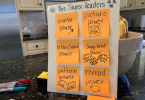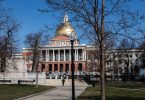By Alexandra Werner Winslow
BU News Service
School resource officers came out in force Thursday night for A Safer Tomorrow, a panel discussion on school safety held at Boston University’s Law School and hosted by the non-for-profit organization Safe and Sound Schools.
“You think of police officers coming to schools, you think of arresting, but that’s the last thing that we do,” said Chip Dapolite, School Liason Officer for the Westborough Police Department. “We’re here to lend support.”
A hushed crowd of about 60 people listened to panel members dig into the details of keeping students safe. In a pragmatic conversation that touched on mental health, building safety, effective communication to parents and even sexual assault, Michele Gay, executive director of Safe and Sound Schools, emphasized the need for collaboration.
“School safety is far too great a responsibility to fall on the shoulders of one institution in our community,” said Gay, as school resource officers, or SROs, in the audience nodded vigorously.
“The best twelve years of my life were as an SRO working with students, parents and teachers to come up with creative ways of making schools safer without making it feel like a prison,” said Mo Canady, executive director of the National Association of School Resource Officers, who joined Gay on the panel.
But not everyone felt positive about the growing presence of school resource officers in K-12 schools.
“I’m still coming to terms with the fact that all of us need to be aware of threats without feeling constantly threatened,” said Meghna Chakrabarti, co-host of Radio Boston on WBUR, who moderated the panel.
As law enforcement around the country comes under scrutiny in the wake of the high-profile deaths of Michael Brown, Freddie Gray and others, a greater police presence in schools can be an uncomfortable reminder of a less-than-perfect criminal justice system.
School-based policing is the fastest growing area of law enforcement, according to the National Association of School Resource Officers, but with no uniformity across the country in training or protocols, its results have been mixed.
A study on a school-police partnership in Chicago, for example, saw a drop in crime of nearly 50 percent thanks to officers’ presence in schools, according to the Council of State Governments Justice Center. However, a national study of officers in schools found no decrease in violent crime and an increase in weapon and drug offenses, while a third study found that having school resource officers led to an increase in arrests for disorderly conduct.
Andre Ravenelle, superintendent of Fitchburg Public Schools and president of the Massachusetts Association of Schools Superintendents, described a job made more complicated by social media and misinformation.
“It’s that balance between keeping safe but also trying to go about our lives,” said Ravenelle. “Schools have changed. A lot of the people who talk about schools haven’t been in schools for 20 or 25 years.”
The U.S. Department of Justice announced almost $45 million to fund an increase in school resource officers following the 2012 shooting at Sandy Hook Elementary School, in which Michele Gay’s youngest daughter Josephine was killed.
“I want my older daughters to love going to school rather than thinking there’s a risk,” said Gay.
For Kristina Anderson, who founded The Koshka Foundation for Safe Schools after surviving the 2007 Virginia Tech shooting, it is shortsighted to debate safety at school without working to determine students’ safety outside of school.
“Violence doesn’t just mean guns. There’s a reverberating effect that perpetrators bring from home to schools,” said Anderson during her remarks on the panel.
According to Matthew Norcross, a school resource officer in Salem, New Hampshire, community work is exactly the point of having law enforcement in schools.
“SROs are the bridge between Friday and Monday,” said Norcross. “Last week I took a kid away from her heroin-addicted mother, put her in foster care. Different kid went home last spring, found dad on the couch dead from a heroin overdose. It’s sad. It’s not easy.”
Scott Paré, deputy director of public safety at Boston University, broadcast the same message to Boston University students and faculty while speaking on the panel with Anderson, Canady, Ravenelle and Gay.
“Police can’t do it by themselves: we need community help,” said Paré.






[…] helped Safe and Sound Schools collaborate with BUPD to hold a school safety panel discussion, “From Tragedy To A Safer Tomorrow.” The event garnered the attention of Governor Charlie Baker’s staff and other local Bostonians […]